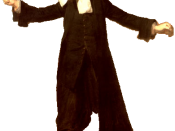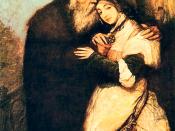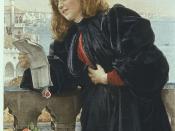The Merchant of Venice opens with a question: Why is Antonio sad? His business acquaintances, Solanio and Salerio, posit two hypotheses: Antonio must be fearing for his ships or suffering the pangs of love. Antonio denies the first suggestion with the claim that he has diversified his investments and evades the second suggestion with "Fie, fie!" But we soon learn that his fortune has indeed been entirely risked "at sea" and, furthermore, that he is prepared to borrow money from a man he hates on behalf of a man he loves. Caught in a set of conflicts difficult to resolve compatibly, Antonio cannot win, for he will lose his friend if Bassanio marries Portia and his money if Bassanio does not.
Inevitably overshadowed by Shylock and Portia, Antonio is nonetheless the structural centre of the play, linking the flesh-bond story in Venice to the casket test in Belmont. That the nominal hero of this comedy is a man whose role on the stage of life is "a sad one" is just one of the ways in which The Merchant of Venice defies our comic sensibilities.
Extreme racial hatred, the spectre of cannibalism and potential adultery haunt the play. Even more disquieting is the suggestion that money is the root of bothhatred and love.
Since Bassanio and Portia, Nerissa and Gratiano, and Jessica and Lorenzo have wooed and wed by the middle of Act III, the main work of the play is not to get the couples together but to resolve two dilemmas: Who will monopolize the Venetian moneymarket? And who will rule Bassanio's heart? The racial and economic rivalry between Antonio and Shylock reflects a specific cultural moment. Although there were no practising Jews in Shakespeare's England, his culture was deeply anti-Semitic and regarded converted Jews with suspicion. The title page of the earliest printed text (1600) advertises "the extreme cruelty of Shylock the Jew towards the said merchant in cutting a just pound of his flesh," indicating the cultural expectation that Shylock, like his dramatic predecessor Barabas in Marlowe's The Jew of Malta, would be a villain.





